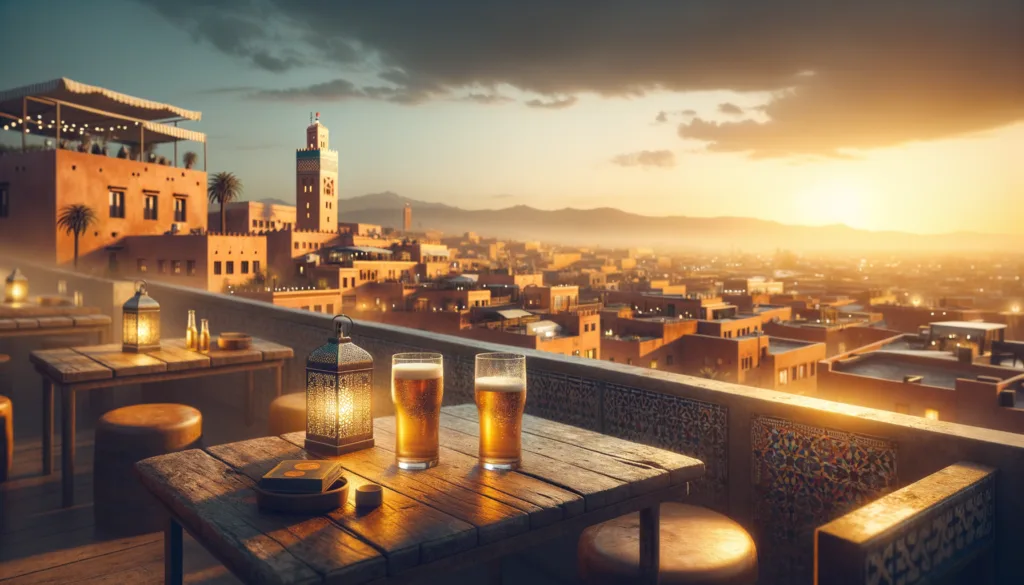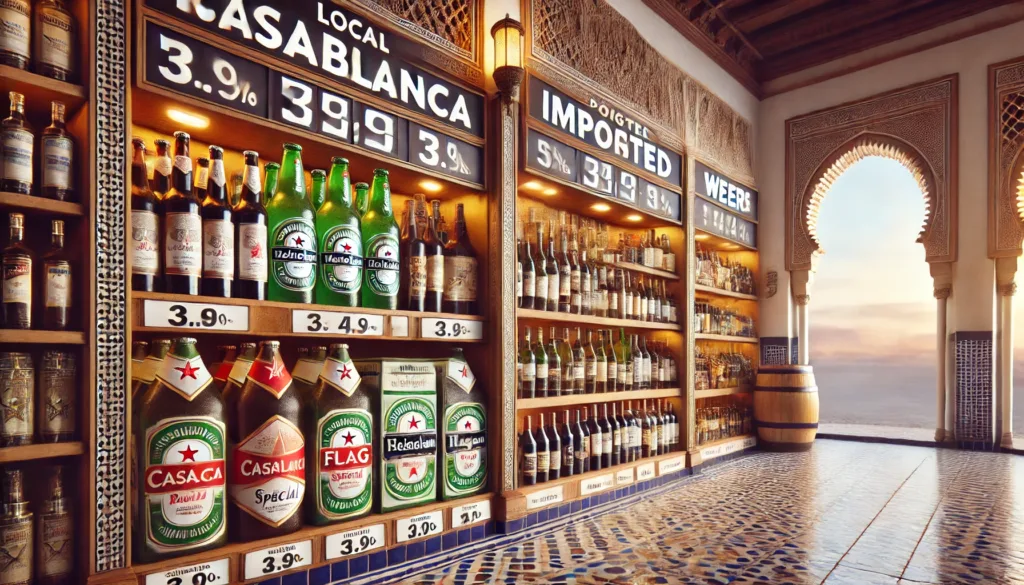
Imagine sitting at a rooftop bar in the heart of Marrakech, the medina’s labyrinth of red-hued walls sprawling in the backdrop, as a waiter brings you a cold bottle of beer. You take a sip, savoring the escape from the desert heat, only to find yourself wincing—at the tab. That bottle just set you back double or even triple what you’re used to paying back home. What’s going on here?
For tourists exploring the vibrant streets of Morocco, the steep price of alcohol can come as a surprise. The reality is, alcohol in Marrakech—and in Morocco as a whole—is significantly more expensive for a host of reasons. From cultural and religious factors to hefty taxes and import duties, the cost of that casual drink in this predominantly Muslim country involves layers that go beyond the glass. This blog will explore the multifaceted reasons behind Morocco’s high alcohol prices and offer insights on what tourists can expect (and how to plan ahead).
One of the primary reasons alcohol is so expensive in Morocco boils down to its limited availability and the cultural context in which it exists. As a predominantly Muslim country, Morocco approaches alcohol through a lens of religious and societal norms that restrict its consumption and sale. While alcohol isn’t explicitly illegal for non-Muslims, its accessibility is tightly regulated.
Cultural and Religious Constraints
Islam, the major religion in Morocco, generally prohibits the consumption of alcohol among its followers. As a result, alcohol occupies a fringe category in Moroccan society, deemed a luxury or indulgence rather than an everyday staple. This cultural backdrop significantly limits its widespread acceptance and normalization.
The Impact of Restricted Sale Locations
Unlike in many Western nations where alcohol can be casually purchased from supermarkets or convenience stores, in Morocco it’s confined to specific outlets. These include licensed bars, upscale hotels, and a handful of specialized liquor stores. Even in these venues, the sale of alcohol can often be discreet, adhering to norms that aim to avoid open promotion. This limited access naturally drives demand high, contributing to elevated prices.
Scarcity as a Price Driver
The principle of scarcity plays a crucial role here. With fewer locations selling alcohol and fewer people consuming it in public, suppliers can afford to charge premium prices. In essence, this creates an exclusivity factor, as alcohol becomes less about availability and more about convenience and luxury.
For travelers, understanding this cultural and logistical reality can be key to navigating Morocco’s alcohol landscape. It’s not just about popping into any store and grabbing a bottle—it’s about knowing where to go, and being prepared to pay for the effort it takes to obtain and serve it.
Taxation on Alcohol in Morocco
One of the primary contributors to the high cost of alcohol in Morocco is the layered system of taxation imposed on alcoholic beverages. These taxes are designed to reflect alcohol’s classification as a luxury product and to align with cultural and economic policies. The result? A significant markup on anything containing alcohol.
Value-Added Tax (VAT)
In Morocco, a standard 20% Value-Added Tax (VAT) applies to most alcoholic beverages. This tax alone is already higher than what you’ll find for many everyday necessities and non-alcoholic goods, making alcohol an especially costly indulgence.
Excise Taxes on Alcohol as a Luxury Product
Alcohol is heavily taxed under excise duty regulations, as it is categorized as a luxury product in Morocco. These levies are applied on top of the VAT, further inflating the price at both wholesale and retail levels. Excise taxes are significantly higher compared to other consumer products, reflecting both government policy and societal attitudes.
Customs Duties and Special Taxes (TPI)
For imported alcoholic beverages, additional layers of expense come into play. Customs duties and a special parafiscal tax (Taxe Parafiscale à l’Importation, or TPI) make importing alcohol into Morocco an expensive process. These extra costs are passed down the supply chain, ultimately affecting the price point that consumers see on the shelves or menus.
The combination of these taxes—VAT, excise duties, and customs levies—results in cumulative pricing structures that can easily double or triple the cost of alcoholic products in Morocco compared to other countries. This makes alcohol a luxury item in both nominal and practical terms.
Imported vs. Local Alcoholic Beverages

The pricing disparity between local and imported alcoholic beverages in Morocco provides an interesting dynamic for consumers. While locally produced drinks offer slightly more affordable options, imported brands are significantly pricier due to additional costs tied to logistics and duties.
Local Favorites: Casablanca, Flag Special, and More
Morocco is home to a few domestic beer and wine brands that are far less expensive than their international counterparts. For example, a bottle of Casablanca or a Flag Special beer typically ranges between 20–30 MAD in local stores or bars. Moroccan wines, though limited in variety, also fall into a similar price bracket, remaining accessible compared to imported options.
The Premium for Imports
Imported alcoholic beverages, including well-known names like Heineken, Budweiser, and premium French wines, can cost upwards of 40–50 MAD per beer. For high-end liquors and spirits, the numbers become even more staggering. Much of this price inflation is attributed to the additional taxes and customs duties that these products incur during importation. Factor in transportation and logistics costs, and the pricing gap between local and imported products widens considerably.
Why Imported Alcohol Costs So Much
- Customs Duties: Imported products are subject to high import duties, which raise their base cost upon entry into Morocco.
- VAT: The 20% VAT applies here as well, adding another layer of costs.
- Logistics and Handling Fees: Transporting alcoholic beverages across international borders, particularly into a limited-access market like Morocco, requires careful regulation and storage, which adds to the expense.
This stark contrast in pricing often encourages budget-conscious tourists and locals alike to opt for locally produced options, though those seeking familiar international brands must be prepared to spend significantly more.
Tourist Areas and Regional Variations
Premium Pricing at Upscale Venues
In Marrakech’s bustling tourist hubs, alcohol often comes with a hefty price tag, especially in upscale hotels, rooftop bars, and restaurants catering to international visitors. A single beer could cost anywhere from 30 to 50 Moroccan Dirhams (MAD), with cocktails and imported wines soaring even higher. These establishments capitalize on the demand from tourists seeking Western-style nightlife, and the prices reflect the premium experience they offer.
Local Establishments: A Slightly Cheaper Alternative
For travelers willing to veer off the beaten path, smaller local establishments or neighborhood bars may offer more affordable options. Local beers, for example, tend to range between 20 and 30 MAD, though the selection often excludes high-end or imported products. While still pricier compared to many Western countries, it’s a marginally more budget-friendly option for those seeking a drink without breaking the bank.
Tourism’s Economic Influence on Alcohol Pricing
The influx of tourists has also indirectly inflated alcohol prices, as businesses in hotspots like Marrakech have adjusted their pricing to match the purchasing power of international visitors. In tourist-dense areas such as Jemaa el-Fnaa, luxurious Riyadhs, and Gueliz, the convergence of limited availability and high demand further drives up costs. Travelers should be prepared to pay a premium for the convenience of having alcohol available in these regions.
Conclusion
Key Factors Driving Up Alcohol Prices
In summary, several interlocking factors explain why alcohol is so expensive in Marrakech and Morocco as a whole: the limited availability of alcohol due to cultural and religious constraints, a heavy burden of taxation that treats alcohol as a luxury good, the added costs tied to imports, and regionally inflated pricing in tourist areas. Together, these reasons create a landscape where enjoying an alcoholic beverage can feel like a splurge rather than a casual indulgence.
Tips for Budget-Conscious Tourists
For tourists looking to balance their travel budget, a practical approach might be to bring alcohol into Morocco within customs regulations, or to explore local brands and establishments that offer better value for money. Additionally, toning down expectations for alcohol consumption while exploring the country’s rich culture, history, and cuisine can lead to a more meaningful and budget-friendly travel experience.
A Final Thought
At the end of the day, the cost of alcohol in Marrakech and Morocco is more than a monetary consideration—it’s also a reflection of the country’s unique cultural, religious, and economic landscape. As you navigate this beautiful destination, embracing its distinct norms can lead to a deeper appreciation of what makes Morocco so special—expensive drinks and all.
Frequently Asked Questions About Alcohol in Marrakech and Morocco
Why is alcohol in Marrakech and Morocco expensive?
Alcohol in Marrakech and across Morocco is expensive due to several factors, including limited availability, high taxation, import costs, and the distinction between local and imported products. These elements collectively contribute to higher-than-average prices for alcoholic beverages compared to many Western nations.
Where can I buy alcohol in Marrakech?
Alcohol is not sold in regular supermarkets or convenience stores in Marrakech. It is only available in licensed bars, hotels, specific liquor stores, and some upscale restaurants. These restrictions on availability help drive up the cost of alcoholic beverages.
What taxes are imposed on alcohol in Morocco?
Several taxes make alcohol more expensive in Morocco, including:
- Value-Added Tax (VAT): A standard VAT rate of 20% is applied to most alcoholic beverages.
- Excise Taxes: Alcohol is subject to excise taxes, which classify it as a luxury good.
- Customs Duties and Other Taxes: Imported alcoholic beverages incur customs duties and a special importation tax (Taxe Parafiscale à l’Importation, TPI).
Are local alcoholic beverages cheaper than imported ones?
Yes, local alcoholic beverages are generally more affordable than imported ones. For instance, local beers like Casablanca and Flag Special may cost around 20 to 30 MAD (approximately 2 to 3 USD), while imported beers like Heineken and Budweiser can cost upwards of 40 MAD (approximately 4 USD).
How much does alcohol typically cost in tourist areas of Marrakech?
In upscale hotels and tourist-frequented restaurants, the price for a bottle of beer can range from 30 to 50 Moroccan Dirhams (approximately 3 to 5 USD). However, prices might be slightly lower in local establishments or less touristy areas.
Can tourists bring alcohol into Morocco?
Yes, international tourists are allowed to bring alcohol into Morocco, but it must adhere to customs limits. Generally, a person may bring up to 1 liter of alcohol. This option may be more cost-effective for travelers looking to manage expenses on alcoholic beverages during their visit.
Why are imported beverages more expensive than locally produced ones in Morocco?
Imported alcoholic beverages are more expensive due to additional costs associated with customs duties, VAT, excise taxes, and the base price of importation. These factors significantly increase their retail price as compared to locally produced options.